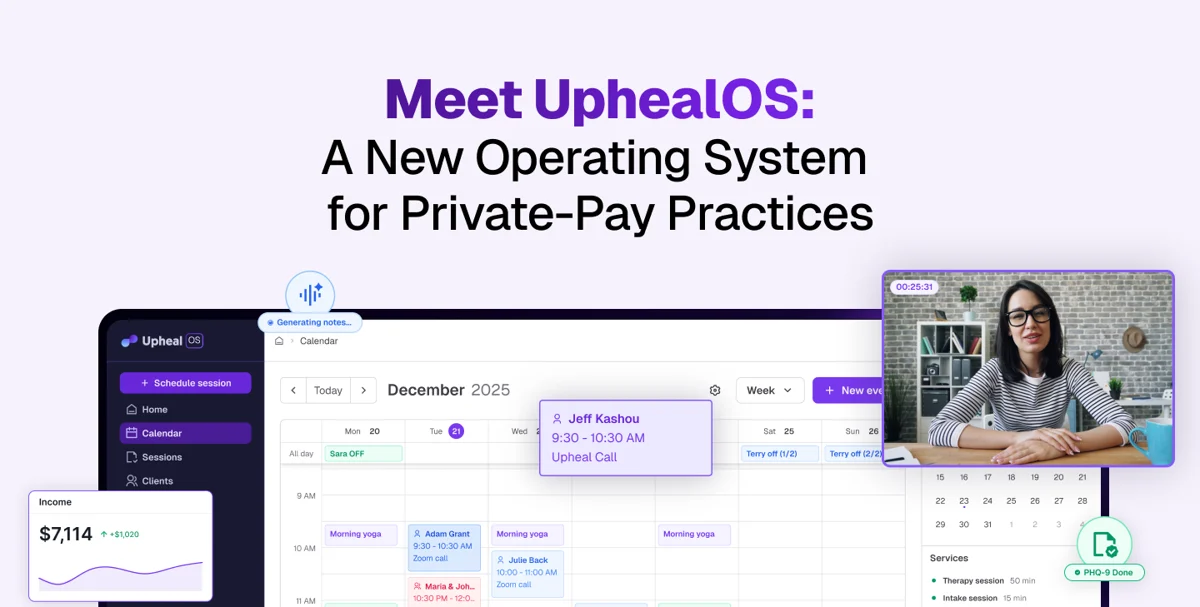A guide to the intake session in therapy and why it’s so important

Part 1 – The intake process
First things first, what does intake mean in therapy?
When beginning therapy with a new client, therapists hold what’s called an intake session.
This is when the therapist collects important information about their client and their history and adds them to their roster or list of patients. The therapy intake session is a hugely important part of the therapeutic process.
There's data gathering using a patient intake form, observing non-verbal behavior, and seeking to establish and clarify the client’s intended therapy goals.
It’s also the first impression a client has of a therapist and their practice.
In this article, we’ll explain why an intake session is so important and explore key aspects to focus on for ensuring a seamless intake process.
Why an intake session so important
As the saying goes, you don’t get a second chance to make a first impression. Handling intake sessions well is both a skill and an art.
It’s a delicate balance between empathically listening and information gathering – while also giving your client insight into how you work as a therapist, and, importantly, what it might be like under your care.
The intake session in therapy is also the first time a client might also broach incredibly tough emotional topics, and it’s important, yet difficult to stay present while also covering the data capture and administrative aspects.
As a therapist you might only have as little as 45 minutes to do essential data capture while building rapport, attending to potentially nervous, first-time-in-therapy clients, and assessing the level of care or risk that might be needed. It's a lot to do at once.
Thankfully, a few things can make this process easier, including our AI Intake notes which do the data capture part for you so you can maintain eye contact, focus, and connection in that first, delicate meeting where a new client shares their troubles and potential goals.
When to hold an intake therapy session
Hold an intake session as soon as possible to cover important things like consent collection and confidentiality after a client reaches out for treatment, and you can tell they are committed to the process.
You might have already mentioned price and session frequency, as well as your credentials, or the potential fit for your client.
You might have also received a referral from a colleague or from an existing or past client.
Setting expectations for intake in therapy
It’s possible to lose a client over a bad intake session. Therefore, it’s really important to cover the question, “what is a therapy intake session?” with your client.
They shouldn’t walk into your office with expectations of getting into some deep discovery or healing work in session 1 and end up disappointed or feeling that therapy isn’t useful or helpful. If this isn’t done properly, it can be risky with certain clients. It’s their chance to think, See, therapy really isn’t for me, before intake for therapy even concludes.
So, let you clients know the first session is more about data collection and chemistry, session cost, duration, expectations, and client questions.
And, also let your clients know the length of the intake therapy session – some therapists like to reserve extra time for this, so 90 minutes can be typical. However, if you work for an organization there may be a certain time lmit you have to adhere to.
Make sure your intake paperwork is done right
The foundation of a good intake session is making sure that both you and the client have all the relevant information needed for working together.
What data you need to collect in an intake therapy session can be helped with an intake session template, but the essentials are:
- Your client's and session details
- Client contact permissions
- Emergency contacts
- Presenting concerns
- Bio-psycho-social assessment
- Insurance or payment information
- Mental health services and medication history
- Mental status exam
- Family history
- Risk assessment
- Intial assessment and clinical plan
- Strengths, weaknesses, and goals
AI Intake notes can truly be a blessing** in this particular situation, allowing you to focus on creating rapport, while a platform like Upheal captures the information for you. You can see a therapy intake note example right here.
When to do your intake notes for therapy
If you’re filling out the form with the client in session, it’s probably advisable to have a longer intake session to make sure you have time to go through it with them.
Although intake forms can sometimes be a pain to fill out during a session, they’re a useful roadmap for the intake process. They’re forms that contain all the basic information about a client, and you can use them during intake sessions to help direct the conversation.
Most therapists have clients enter basic information on a simplified form before an intake session, and fill out some information during the session.
Share a little to create rapport
As well as collecting important client information, remember to also share your professional experience, and a little about therapy itself in case this is the client’s first time in therapy.
This can open up conversation gradually, for more nervous clients, although some therapists may also feel nervous in the first session as so much is established.
Before discussion gets too deep, some therapists like to offer tea or water to help break the ice during the intake session.
Spend time on consent and agreements
Intake paperwork can also mean signing consent agreements. Informed consent is a process that involves the therapist sharing sufficient information with the prospective client so they can make an informed decision about participation in the proposed course of treatment.
Informed consent should be a continual practice, but it’s especially important in the intake process so clients can make an informed decision about whether or not they want to work with you.
Informed consent also means discussing:
- The nature and anticipated course of treatment
- The psychotherapist’s credentials and relevant professional experience
- The client’s right to refuse or withdraw without penalty (participation is voluntary)
- Reasonably available treatment options and alternatives, and their relative risks and benefits
- Fees and financial arrangements to include billing, payment, and the role, if any, of insurance
- Confidentiality and its limits i.e. mandatory reporting requirements (duty to report)
- Involving other health professionals (inform the client what you might need to share)
- Older children or teens should know what’s being communicated to their parent or guardian
- Tell clients paying with insurance what you’ll share with their insurance company, and how their diagnosis might impact their insurance in the future.
That in itself can be tricky to do well while juggling the empathy aspect, so some therapists like to send the consent form and patient intake template beforehand.
Or, as mentioned before, you can also always use an AI notes platform like Upheal to cover things like consent collection and privacy policies, leaving you free to focus on your client.
Intake in therapy also means ensuring a client-therapist fit
An often overlooked aspect of the intake session is also doing an audit of the client-therapist fit.
Different therapeutic approaches, life experiences, personalities, cultures, ages, gender, and even budget, all contribute to whether there is a therapeutic fit or not, and this can often be spotted in the intake process.
Some advise to try at least 2-3 sessions before coming to a firm decision, however, if you know that as a practitioner that you, for example, have your own work to do in the exact areas the client is working on, or that there are signs of transference that make the relationship unhealthy (it doesn’t always have to be) it is your ethical responsibility not to enter the therapeutic relationship unless you know you can offer the best possible care.
Simply put: not every client is meant for every therapist and vice versa.
Therapy intake assessment – an initial diagnosis
After you go through some of the more administrative aspects, the client should feel a little bit more comfortable. They’ll have some details of how you work and how therapy works, and hopefully be more able to open up.
At this point, it’s a good time to go over the reasons a client has decided to seek therapy.
You can then make an initial assessment of their symptoms, challenges, or potential dignoses, but make sure that you accept these are likely to change in the future as you learn more about your client. It’s not possible to catch all issues from a first encounter.
The assessment may just be a discussion of their presenting issues or can include actual diagnostic test if the client is paying with insurance and can include a suicide risk assessment. This is all a part of intake in therapy.
Adjust to your client and use your experience
If a client with severe mental health challenges comes in, they may simply not withstand the endless questions that an intake process entails, especially if the clinician hasn’t prepared them or doesn’t know how to naturally adjust to the client.
Find ways to get the information without losing your client and make sure to respect their current state.
How AI intake notes can improve your intake session
Using AI intake notes is a great way to help therapists save time and mental energy while allowing them to build the therapeutic alliance from day 1.
It’s helpful to hear and see the client express their history, current situation, and therapy goals without having to scribble notes or type away busily into a tablet, losing moments of eye contact or even bids for connection.
Not only does an AI scribe like Upheal allow the therapist time to asses their client more easily, it also saves them precious time in the paperwork stage, and allows them to build trust and rapport faster.
They can spend the therapy intake session doing what they are best at: observing things like body language, hygiene, speech cadence, awareness of boundaries, energy, and so on.
While an experienced therapist is able to gather notes and use the session to appraise the state of their client-to-be, the truth is that it is demanding and takes up far too much of the therapist’s cognitive load when they could already be connecting.
The therapist can rely on the AI to be the scribe and can focus on asking the right questions, appraising, stabilizing, and building the therapeutic alliance from the get-go. After all, both need to see if the relationship is to be a good fit.
Lastly, talk about the next steps
Once you have a general impression of what your client is struggling with, share your thoughts on what treatment might look like. If you haven’t already, ask your client if this aligns with their treatment goals, and make sure to include them.
Alternatively, if your client’s issues are complicated, let them know that you’ll need a few more sessions to come up with a treatment plan. And, if their issues are beyond the scope of your expertise, explain that you’ll need to refer them to someone more suited to helping them.
At the end of the session, the client should know everything they need to know about working with you and be able to make an informed decision. There shouldn't be any pressure to book another session - let them know it’s completely up to them, and give them the space to think about it.
And finally, in today’s technical world, you might also want to discuss how you’ll communicate – some therapists use social media, some email, some text, some text messages. Make sure you are working within HIPAA laws for your region, and agree on which method of communication your client prefers.
Concluding thoughts
We hope this guide has helped you improve and further prepare your current intake session process! As we described above, there is a lot to capture and consider throughout the intake session and intake documentation process. If you’d like to try Upheal’s AI Intake notes for free, you can sign up for Upheal right here.
Thank you for reading. 🙏🏼












